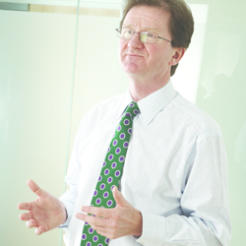The Charity Commission must not be put off from trying to create a standard format by which charities can report their spending by the complexity of the task, a charity chief executive told the Commission’s chair and CEO last week.
Chris Jones from neurological support charity Cerebra said he thought the Commission should certainly attempt some form of interpretive analysis of charities’ accounts in order to assist the general public to understand the messages that arise from the financial information.
He added the Commission must not allow itself to be put off by “political correctness” or the apparent difficulty of the task and should strive to adopt a pragmatic approach in order to help the public glean more useful information from the data that charities provide.
He cited as an example a model adopted by his own charity for allocating the costs of his own salary in the annual accounts: “We split my salary into defined trustee-approved percentages: 40 per cent is admin, 30 per cent fundraising and 30 per cent is allocated to the cause, because that is how we agreed my time is split within the office. I know it’s simplistic and by no means perfect but at least it’s a help in giving the public more than they’ve currently got to go on.
"I don’t think you should shy away from this because of deference to the pursuit of purity,” Jones concluded.
In response, Commission chief executive Sam Younger said such a simple solution was very attractive but he could already hear the objections from the Sorp Committee.
“The fact is that this is inherently complex,” Younger said. “But that doesn’t let us out of looking for ways of getting a clearer picture to the public about what their money is being spent on.”
He added: “I think it is right to say the Commission should not just wash its hands of interpreting data. There is always an element of self-interest but there could be a role in providing aggregations of data, providing comparability of data, to help people find all this stuff. We need to think about ways we can make it more user-friendly.”









